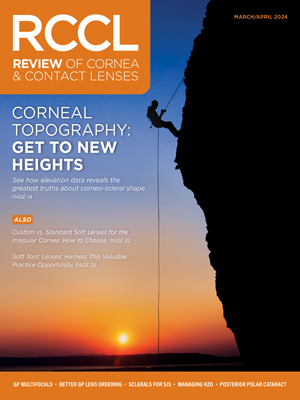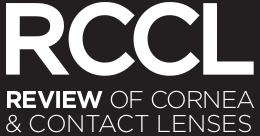 Zirgan (gancyclovir ophthalmic 0.15% gel, Sirion Therapeutics) has been the standard for treating ocular herpes outside the U.S. for years because of the drug’s better efficacy and tolerance when compared with more cytotoxic compounds.1 Approval of gancyclovir ointment represents the first new medication for the treatment of herpetic keratitis in the U.S. in more than three decades.
Zirgan (gancyclovir ophthalmic 0.15% gel, Sirion Therapeutics) has been the standard for treating ocular herpes outside the U.S. for years because of the drug’s better efficacy and tolerance when compared with more cytotoxic compounds.1 Approval of gancyclovir ointment represents the first new medication for the treatment of herpetic keratitis in the U.S. in more than three decades.
In 2007, Sirion Therapeutics requested orphan drug status since the medication is expected to treat less than 200,000 patients in a calendar year in the U.S. In early 2009, they filed an FDA application for review as a new drug in the U.S. after having conducted four multicenter studies.2 In these comparison tests, gancylovir 0.15% gel was compared against acyclovir 3% ointment with the results showing both therapies to be effective. But, the gancylovir patients reported better drug tolerability, less stinging and burning, and better vision.
By now, the astute reader should be asking, “Do we need another topical antiviral?” The truth is that we do. Much like we have all seen with antibiotics, even tried-and-true antivirals lose their effectiveness. Herpetic keratitis can become resistant to acyclovir, the recognized gold standard for treating chronic herpetic disease. In fact, one study determined that 173 immunocompetent patients with herpetic keratitis were acylovir resistant.3
Herpetic resistance to acyclovir has been a serious concern for some time. It is known that resistance is a problem in immunocompromised patients, especially those who have had bone marrow transplants.4 Suspicions are directed at mutations of one of two enzymes involved in the acyclovir pathway—either DNA polymerase or thymidine kinase.5 Unfortunately, a developed resistance here will generally impart problems for use of penciclovir, the active ingredient in some cold sore medications, or famciclovir, the active ingredient in the herpes zoster medication Famvir (Novartis). For these reasons, the development of new medications is very important.
Is there any decrease in performance with gancyclovir ointment when treating patients with dendritic disease? Numerous studies have been conducted comparing the acute treatment of herpetic keratitis. One such study evaluated 99 trials involving 5,363 patients that occurred over three decades.6 Criterion for review included comparison of one- and two-week healing rates for topically applied medications, such as vidarabine, trifluridine, acyclovir and gancyclovir, and/or physical or chemical debridement of the lesion. While interferon therapy was slightly more effective for the treatment of dendritic lesions, it was otherwise a close call to make. In other words, all of the other medications all performed similarly.6
Perhaps there are two points to keep in mind when considering the medications that currently represent shortcomings of trifluridine—toxicity and availability of the medication. In looking at the in vitro effects of medication on human keratocytes, researchers found that when cultured human keratocytes were exposed to varying concentrations of gancyclovir, idoxuridine, trifluridine or cidofovir, it was trifluridine that reduced cell viability more significantly than the other three.7 In vitro doesn’t always apply to in vivo results, but knowing the cytotoxicity of the medications should give us some insight into the damage that is going on in the eye.
Gancyclovir gel is available as an ointment and can be stored at room temperature. Will this improve the availability of the medication? We all know it can be difficult to get vidarabine because it needs to be kept refrigerated, so pharmacies don’t always stock it. Time will tell, but our hunch is “Yes!”
Zirgan represents a new (but old) treatment for patients with primary herpes infections. Literature shows it to be safe, effective and well tolerated. It appears to be a medication that not only helps us win the war against herpetic keratitis, but also survive the battle by not creating excessive cytotoxicity. Hopefully, insurance companies will see fit to make it available for patients.
1. Colin J. Gancyclovir ophthalmic gel, 0.15%: a valuable tool for treating ocular herpes. Clin Ophthalmol. 2007 Dec;1(4):441-53.
2. Sirion therapeutics new drug application for ganciclovir is accepted for review by the FDA for the treatment of ocular herpes. Available at: www.medicalnewstoday.com/articles/136720.php. (Accessed January 2010).
3. Duan R, de Vries RD, Osterhaus AD, Reneijer et al. Acyclovir-resistant corneal HSV-1 isolates from patients with herpetic keratitis. J Infect Dis. 2008 Sep 1;198(5):659-63.
4. Morfin F, Thouvenot D. Herpes simplex virus resistant to antiviral drugs. J Clin Virol. 2003 Jan;26(1):29-37.
5. Gilbert C, Bestman-Smith J, Boivin G. Resistance of herpesviruses to antiviral drugs: clinical impacts and molecular mechanisms. Drug Resist Updat. 2002;5:88-114.
6. Wilhelmus KR. Therapeutic interventions for herpes simplex virus epithelial keratitis. Cochrane Database Syst Rev. 2008 Jan 23;(1):CD002898.
7. Moreira LB, Oliveira C, Seitz B, LaBree L, McDonnell PJ In vitro effects of antiviral agents on human keratocytes. Cornea. 2001 Jan;20(1):69-72.


